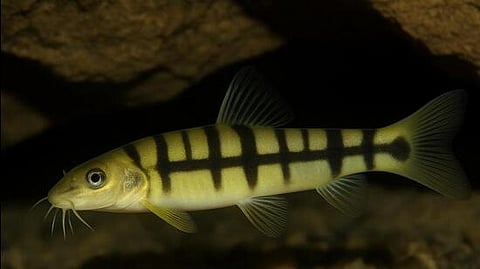
- Home
- Live Blog
- Breaking News
- Top Headlines
- Cities
- NE News
- Sentinel Media
- Sports
- Education
- Jobs

GUWAHATI: In a significant advancement for biodiversity research, a team from Gauhati University, led by Dr. Kangkan Sarma, has identified a new species of cave-dwelling fish in the intricate depths of Meghalaya’s limestone caves. Named Schistura densiclava, this loach represents the team’s ninth discovery of its kind, reinforcing their role as pioneers in exploring the hidden ecosystems of Northeast India.
The discovery was made in collaboration with researchers from Lady Keane College, Shillong, and the ICAR-National Bureau of Fish Genetic Resources, Lucknow. Found hundreds of metres underground in the pitch-dark caves of Meghalaya, Schistura densiclava exemplifies the resilience of life in extreme environments. These caves, part of an estimated 1,500 to 1,700 limestone and sandstone systems in the state, are known for their complexity and inaccessibility, located in remote, forested regions. A BBC report has also highlighted this unique discovery and noted challenges faced by the team, navigating difficult terrain to access these unexplored subterranean habitats.
The achievement has also resonated locally, with Meghalaya’s Chief Minister, Conrad Sangma, congratulating Dr Sarma and his team. His message praised the researchers for “shining a light on the hidden biodiversity” of the state, highlighting the pride this discovery has instilled in the region.
Schistura densiclava is a small, elusive loach adapted to a lightless existence. Its unique physiological traits, shaped by evolution in complete darkness, distinguish it from other known species. The fish’s discovery enhances the catalogue of Meghalayan biodiversity, a region already recognised for its ecological richness. Dr Sarma and his team’s meticulous taxonomic analysis revealed the loach’s distinct characteristics, setting it apart from its relatives. This finding deepens the understanding of cave ecosystems and highlights the untapped biological wealth of Northeast India.
“This discovery is a matter of immense pride for Gauhati University and highlights our commitment to advancing scientific knowledge through rigorous research,” said Prof. Nani Gopal Mahanta, Vice Chancellor of Gauhati University. “The team’s dedication to uncovering the hidden treasures of our region’s biodiversity is truly inspiring and sets a benchmark for academic excellence.”
Dr. Kangkan Sarma reflected on the significance of the find: “Discovering Schistura densiclava in the challenging environment of Meghalaya’s caves is a testament to the resilience of both nature and our team. Each new species we uncover deepens our appreciation for the complexity of these ecosystems and fuels our passion to explore further.”
The finding, reported by the BBC News, highlights the scientific importance of this contribution. The report described the arduous conditions under which the researchers worked, noting the significance of their persistence in documenting life forms that thrive in such inhospitable settings. This coverage has drawn attention from the scientific community, with experts recognising the potential for further discoveries in Meghalaya’s largely uncharted cave systems, a press release said.
Also read: Rangia Fish Seed Market Boosts Jobs and Aquaculture in Northeast Assam
Also Watch: